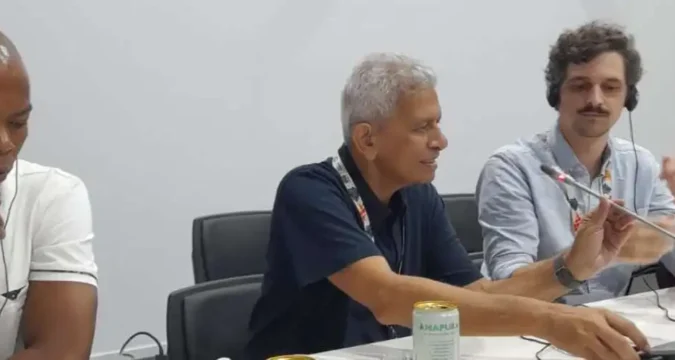
BELEM (UCAN): For Claretian Father Rohan Dominic, the coordinator of the Claretian team at the United Nations in New York, climate action is no longer a choice but a calling, especially for the Catholic Church.
He believes that the November 10–21 COP30 in Belém, Brazil, where faith-based groups gathered in unprecedented numbers, was a turning point for the Church.
“You won’t believe it,” Father Dominic said. “Around eight cardinals, forty-seven bishops, and over a hundred Catholic actors [were there]. This is the largest-ever representation from the Church at a COP.”
As for his presence there, the Claretian missionary said he had been striving to turn awareness into action within the Catholic world.
Father Dominic believes the Church “must go beyond moral exhortation and take an active role in shaping global climate policy.”
Having previously served as the regional superior of the Claretians in Sri Lanka and worked across Asia, he is striving to bring pastoral compassion and advocacy experience to the global climate discourse.
Around eight cardinals, forty-seven bishops, and over a hundred Catholic actors [were there]. This is the largest-ever representation from the Church at a COP
Father Dominic
“While climate impacts are severe across the region, the level of public understanding and policy engagement remains low,” he observed. “Even among clergy, climate action is often seen as beach cleaning or tree planting.”
He added that these actions were good, but they are not enough. Hence, he stressed the need for “climate education”, not just awareness.
“This means equipping people with the skills and understanding to advocate, adapt, and act,” he said, while adding the importance of “moving beyond symbolic gestures to transformative learning.”
For many Asian nations, the effects of global warming—floods, droughts, and rising sea levels—are compounded by poverty and governance challenges.
“The developed countries have polluted the world, and we are the ones suffering,” he said.
Father Dominic described COP30 as “an extraordinary COP” for the Catholic Church.
While climate impacts are severe across the region, the level of public understanding and policy engagement remains low
Father Dominic
Historically, the Church’s involvement in global climate forums had been minimal. This year, that changed, he observed.
The participation had been coordinated by the Catholic Bishops’ Conference of Brazil and supported by CELAM, the Latin American Bishops’ Council.
The Church’s delegation was actively engaged in discussions on just transition, global stock take, and Article 6 of the Paris Agreement.
The Claretians have been focusing on transformative change for several years. “We are stressing the need for change in the hearts of people, not only in structures or systems.
“We are pitching that false solutions cannot solve real problems. Our focus is on loss and damage, just transition, and ensuring that people remain at the centre of every discussion,” he explained.
For many Asian nations, the effects of global warming—floods, droughts, and rising sea levels—are compounded by poverty and governance challenges
The Claretian Missionaries, through their representation at the UN and collaborations with agencies like Proclade Internazionale, have integrated the Sustainable Development Goals [SDG] into their mission framework.
Pope Francis’ encyclical, Laudato Si’, and his call for climate justice have inspired many within the Church to move from reflection to engagement, he said
“The pope invited all to involve themselves in climate justice, not just to talk about the situation but to act. As a congregation, we’ve been attending the COPs for the last few years because we see this as part of our spiritual and social responsibility,” Father Dominic explained.
For the Claretians, the voices of indigenous communities are central to climate justice.
“The world has forgotten the wisdom of indigenous people. They have protected nature for generations, yet their knowledge is often dismissed,” he lamented.
Father Dominic noted that environmental defenders, many from indigenous communities, faced persecution. “Many are criminalised or even killed. We stand with them,” he said.
The world has forgotten the wisdom of indigenous people. They have protected nature for generations, yet their knowledge is often dismissed
Father Dominic
The Claretian policy brief presented at COP30 called for two key actions: the decriminalisation of environmental defenders and the demilitarisation of biodiverse territories.
“Military operations in these regions destroy biodiversity and displace communities. We are urging world leaders to address this,” Father Dominic pointed out.
Pope Francis often described climate change as a “moral debt” owed by the rich to the poor and the priest sees this as a moral imperative for all faith-based actors.
“Catholic organisations here are focusing on ecological debt and debt cancellation. The developed countries must be held accountable for what they have done. This is not charity, it is justice,” he explained.
He noted that Laudato Si’ continues to resonate across the climate movement.
The Federation of Asian Bishops’ Conferences has a climate-change desk, which is a good start. But much more needs to be done
Father Dominic
“World leaders often quote Pope Francis. They may not follow all his words, but his message is in their minds,” the priest remarked.
Father Dominic believes the success of COP30 depends on moral leadership.
“It will depend on whether world leaders are ready for transformative change. If negotiations are guided by truth and courage, COP30 can be a turning point,” he observed.
As far as the Church is concerned, Father Dominic believes collaboration is the key.
“The planet is for all. We must join hands with civil society, with other faiths, with grassroots groups. The Church should not always aim to lead, but to partner,” he said.
In South Asia, where economic inequality and climate disasters intersect, faith-based networks can play a decisive role.
However, he conceded that the Church’s involvement in Asia was still limited.
“The Federation of Asian Bishops’ Conferences has a climate-change desk, which is a good start,” he observed. “But much more needs to be done.”
The Church cannot stay on the sidelines. Faith must translate into advocacy, and advocacy into action, the Claretian priest added.



